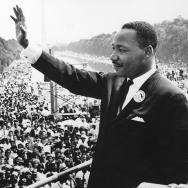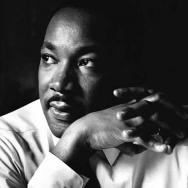“We are gathered here today to honor not only the father of the Civil Rights movement, but the father of American democracy as we know it,” said author Isabel Wilkerson at the University of Chicago’s commemoration of Dr. Martin Luther King Jr., whose tireless activism led to the passing of the Voting Rights Act in 1965.
By fighting to expand voting rights to Black Americans, she said, King and other organizers sought to fulfill the promise of democracy—and undo the ways in which slavery has shaped America.
“Slavery is so foundational and lasted for so long, that it will not be until the year 2022, next year, that the United States will have been a free and independent nation for as long as slavery lasted on this soil,” said Wilkerson, the author of The Warmth of Other Suns and winner of the National Humanities Medal.
The first Black woman to win a Pulitzer Prize in journalism, Wilkerson spoke Jan. 12 at UChicago’s 31st annual commemoration of the life and legacy of Dr. King. Traditionally held at Rockefeller Memorial Chapel, where King spoke twice—first in 1956 and again in 1959—this year’s event was held virtually before an audience of over 2,000 people.
“Dr. King was a forceful advocate, not only for freedom and civil rights, but for the importance of building a society that incorporated diversity and inclusion at its core,” said UChicago President Robert J. Zimmer. “In other words, his vision was not only about the individual and the rights and freedom that each person should enjoy, but also of society as a whole and how it should function beyond the individual.”
Wilkerson’s latest book, Caste: The Origins of our Discontents, connects the oppression of Black Americans to caste systems around the world. In her remarks, she referenced King’s visit to India in 1959, and how he came to recognize in India’s “untouchables” a struggle similar to what Black people faced in his own country.
She also underscored how the moral battles we think of as having been won are still all too present for us today. Wilkerson imagined how King would have felt to see Raphael Warnock—the pastor at King’s own Ebenezer Baptist church—become the first Black person to be elected to the U.S. Senate from Georgia. She noted how that joy would have faded to heartbreak and renewed resolution, following the Jan. 6 siege of the U.S. Capitol.
The violence in Washington, D.C. “made it wrenchingly clear that Dr. King’s mission has not been completed,” she said. “It will be up to all of us, particularly the prime beneficiaries of our country’s 400-year-old social order, to make it so.”
Since its inception in 1990, UChicago’s annual commemoration has featured prominent speakers, including President Barack Obama, Angela Davis and Rev. Jesse Jackson. The event also provided an opportunity for Zimmer to recognize the recipients of the University’s Diversity Leadership Awards, given each year to UChicago faculty, alumni, staff and students who have made a significant impact in advancing diversity and social justice.
This year’s celebration—which included remarks from third-year undergraduate Dinah Clottey and Justin Douglas, a master’s student in UChicago’s joint program for social work and public policy—also featured performances from the Chicago Children’s Choir and the Timeless Gifts Youth Program for the Performing Arts.
“You heard tonight that Martin Luther King Jr. wrote in his letter from the Birmingham jail that change never rolls in on the wheels of inevitability but through the tireless efforts and persistent work of dedicated individuals,” said Maurice Charles, dean of Rockefeller Chapel, in his closing remarks. “The time is always ripe to do right.”
Pointing out how we’re on the cusp of a presidential inauguration in a deeply divided country, Charles invoked King’s 1968 words that we must be “creative dissenters”—those individuals who call the United States to a higher destiny, greater heights of compassion and to a more noble expression of humanity.
“How can I be a creative dissenter?” he asked the audience to ponder. “May you have the courage to keep asking the question, and the grace and humility to receive the answer.”

